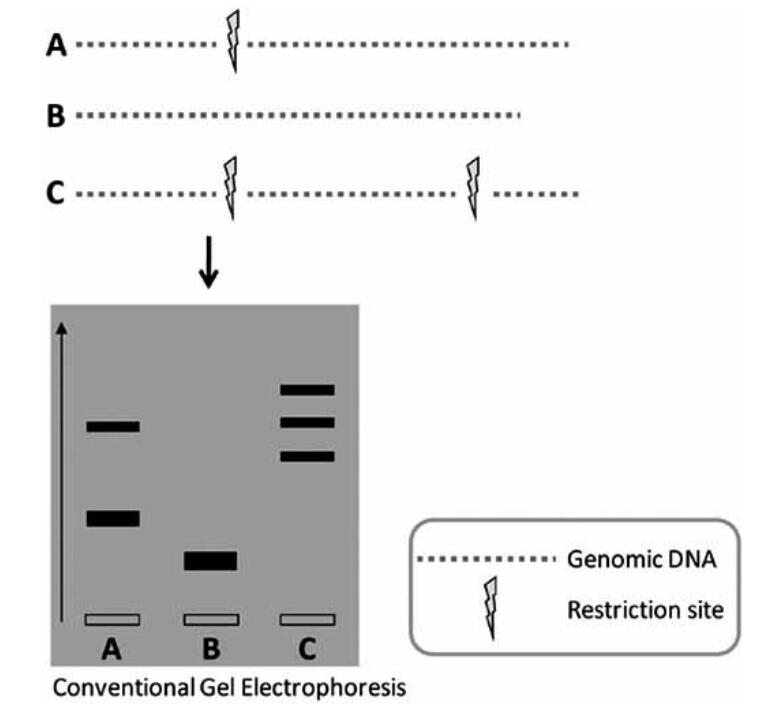Restriction fragment length polymorphism (RFLP) was the first molecular marker technique and the only marker system based on hybridization which is one of the most important analytical methods in molecular biology. The principle of this technique is to detect the size of specific DNA fragments formed by restriction endonuclease digestion of DNA. Therefore, all mutations that can cause mutations in restriction sites, such as point mutations (new generation and removal of restriction sites) and recombination of DNA fragments (such as insertions and deletions leading to changes in the length between restriction sites) can lead to the production of RFLP. RFLP, as a molecular marker, is specific to a single clone/restriction enzyme combination. Lifeasible provides professional, accurate, and fast RFLP technology services to customers worldwide.
 Figure 1. Schematic representation of the RFLP method. (Pereira F, et al. 2008)
Figure 1. Schematic representation of the RFLP method. (Pereira F, et al. 2008)
RFLP can be applied in diversity and phylogenetic studies ranging from individuals within populations or species to closely related species. RFLPs have been widely used in gene mapping studies because of their high genomic abundance due to the ample availability of different restriction enzymes and random distribution throughout the genome. They also have been used to investigate relationships of closely related taxa, as fingerprinting tools, for diversity studies, and studies of hybridization and introgression, including studies of gene flow between crops and weeds.

There has been a new fusion of RFLP analysis techniques, such as terminal restriction fragment length polymorphism (T-RFLP) is an extension of RFLP, which is a microbial population mapping method based on the fluorescence-labeled primer PCR to analyze the composition of microbial population according to the length of the terminal restriction fragment. Its basic principle involves the restriction endonuclease digestion of terminal fluorescence-labeled PCR products. T-RFLP has the advantages of high speed, high repeatability, sensitivity, and high throughput. Besides providing RFLP technical services, Lifeasible also provides T-RFLP technical services to plant researchers and related technicians worldwide.

Lifeasible is a world-class phytotechnology company with extensive experience in RFLP and T-RFLP technical services. We provide complete solutions for you and our customers can get the raw data sheet, raw images, primer sequences, professional analysis results, and complete experimental reports as soon as possible after the experiments are finished, and after-sales service will be done by our staff in follow-up. If you have any questions about the experimental results, you can contact our staff at any time, we provide the most cost-effective service, efficient and professional is our customers' greatest evaluation of Lifeasible.

Lifeasible offers complete, professional RFLP technology service, as well as customized experimental protocols based on your project requirements and plant sample characteristics. For more information, please contact Lifeasible.
Reference:
Lifeasible has established a one-stop service platform for plants. In addition to obtaining customized solutions for plant genetic engineering, customers can also conduct follow-up analysis and research on plants through our analysis platform. The analytical services we provide include but are not limited to the following:
July 13, 2024